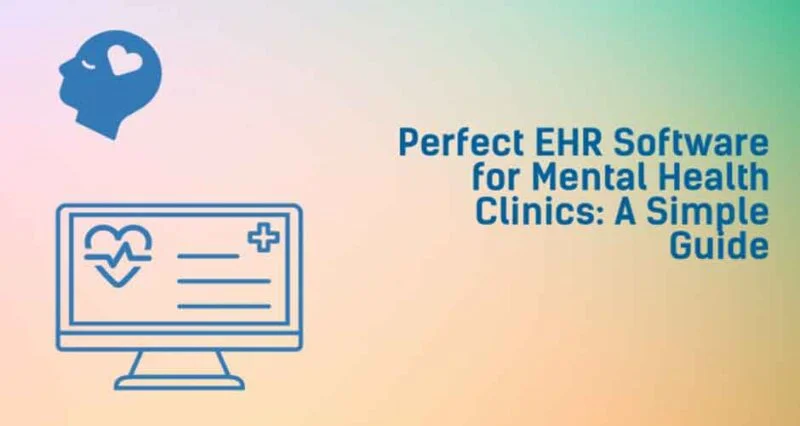
Searching for an electronic health records (EHR) solution suited for your mental health practice? You’re in the right place. Our guide cuts through the maze of options to spotlight top-notch platforms tailored for behavioral health clinics.
Choosing the appropriate EHR software for your therapy, counseling, or psychiatry practice is a significant undertaking. With hundreds of products with overlapping capabilities on the market, the evaluation process can leave you lost. Where do you start? What features matter in mental healthcare? How do you ensure optimal clinical workflows? This is where we step in.
As seasoned EHR consultants assisting mental health professionals find platforms attuned to their needs for over a decade, we understand your pain points. Whether it’s clunky legacy systems, limited telehealth capacities, data security threats, or productivity lulls with existing tools, suboptimal EHR software exacerbates daily challenges for clinics. We’ll address the root causes, guiding you to simplifying solutions. By the end, you’ll have clarity for making a confident EHR investment that drives efficiency, safety, and growth in your mental health practice.
The Growing Need for EHR Systems in Mental Health Care
The prioritization of mental health issues has never been more crucial, with the COVID-19 pandemic intensifying conditions like anxiety, depression, and substance use disorders globally. Mental disorders account for 13% of the global disease burden, and major depression alone is expected to be the largest contributor by 2030. In light of these alarming projections, robust EHR platforms are pivotal for scaling and sustaining behavioral care.
Specialized EHR software for mental health empowers providers, therapists, and social workers alike to render coordinated, evidence-based care customized to individual requirements. By automating administrative and documentation activities through HIPAA-compliant platforms, clinicians can allocate more attention to service delivery. Such streamlining of tasks is linked directly to the Triple Aim goals of enhancing population health and patients’ overall experience while optimizing costs. In addition, purpose-built systems facilitate progress tracking for diverse interventions, from counseling to medications to community referrals – illuminating gaps in continuity of care.
Seamless data interoperability connects the dots between hospitalization events, ER visits, primary clinicians, and specialists involved in patients’ journeys, facilitating care coordination. Finally, with telehealth adoption surging amid the pandemic, integrated systems enable rapid scaling of virtual mental health services to broaden access.
By investing in targeted solutions addressing the nuances of mental healthcare workflows, clinics can activate the transformative potential of health IT to close care gaps and elevate care standards across communities.
Core Features to Look for in Mental Health EHR Software
Selecting specialized EHR software aligned with mental and behavioral health settings’ unique needs is pivotal, yet challenging. The sophisticated functionality required exceeds generic health IT systems lacking psychology-centered customization.
When gauging an EHR software, several must-have capabilities should top the checklist:
Customizable Assessment Templates & Progress Notes
Mental health assessments and treatment plans for conditions spanning anxiety, depression, substance abuse, trauma, eating disorders, and more require tailored EHR tools.
Pre-configured, evidence-based templates facilitate thorough, standardized patient evaluations while saving clinicians hours otherwise spent constructing individualized forms, questionnaires, scales, and risk assessment checklists from scratch every session. Libraries with hundreds of customizable templates boost efficiency.
EHR systems with flexible templates easily modified to incorporate supplemental data like genograms detailing family dynamics and histories, along with room for session notes, boost documentation accuracy for individual needs. Such clinical decision support promotes optimal, holistic care.
EHR Software Platforms enable:
- Selecting pre-built templates aligned to specific mental health conditions while modifying descriptors and including personalized questions
- Constructing individualized questionnaires pulled from validated psychological/behavioral metric banks
- Embedding external content from materials like suicide risk protocols and lab results into protected progress notes
- Auto-scoring complex multi-axial scales to inform diagnosis & treatment
Telehealth Capabilities
Between pandemic-triggered reliance and permanent shifts toward teletherapy, integrating mental health EHR platforms securely with telemedicine apps enabling remote consultations is now non-negotiable.
Look for:
- Telehealth widgets for seamless video conferencing, screen sharing, and messaging
- Remote intake, assessment, safety reviews, and Multi-Factor Authentication
- Technical integrations allow appointment scheduling, payments, insurance credentialing, and EHR charting from one interface
HIPAA-Compliant Security
For settings managing highly sensitive mental health records, from psychotherapy notes to substance abuse details, advanced cybersecurity protections and HIPAA compliance are mandatory.
Target platforms with
- End-to-end data encryption safeguards PHI access, storage, and transmission
- Sophisticated user access controls and permission tiers by role
- Activity logging for security audits
- Integration with services like therapist messaging apps to contain risks
Fines for compromised mental health data average $250,000. Prioritizing security protects both patients and the practice itself.
Intuitive, Unified Interface
Even platforms with robust capabilities will underdeliver if not intuitively designed for clinical mental health teams.
Seek EHRs with:
- Modern dashboards require minimal clicks to complete multi-step workflows like logging safety incidents, sending referrals, scheduling recurrent visits, and updating treatment plans
- Consistent presentation of historical patient data, upcoming appointments, and outstanding lab/Rx orders organized by due dates
- In-workflow support options like chatbots reduce disruption for ad hoc system questions
An intuitive, unified EHR interface eliminates usability roadblocks, allowing clinicians to fully leverage solutions that advance care.
With demand intensifying for mental health services, purpose-built EHRs allow private practices and dedicated clinics alike to deliver the highly coordinated and personalized care patients deserve while maximizing accessibility and provider capacity through enabling tools like pre-configured templates and telehealth extensions. Keep this checklist handy when evaluating specialty EHR options to determine the best-matched platform promoting safety, efficiency, and treatment quality at your organization.
Integrations with Referral Networks and Services
With mental healthcare relying heavily on coordinating care across diverse specialty providers ranging from counselors to community health workers to peer support groups, EHR integration with wider referral networks is pivotal. Seeking platforms that allow smooth bi-directional data exchange with partners receiving or providing referred services like psychiatrists, crisis centers, group therapy settings, and residential programs is key for continuity of care. Direct messaging between care team members also enables warm hand-offs critical for vulnerable patients.
Customized online member directories matching patients with specialists or services by treatment type, language/cultural competencies, accepted insurance plans, etc. improve access. Additionally, automated referrals integration that saves manual follow-up on faxed forms reduces errors for closed-loop connections.
Intelligent connectivity preserves continuity between mental healthcare providers, ensuring a more holistic and integrated treatment delivery as patients transition between services. For smaller practices, cloud-based EHRs also offer marketplaces to directly search and connect with local therapists, prescribing providers, testing labs, and pharmacies from within the system for seamless transitions.
Embedded Analytical Capabilities
While recording each patient’s clinical narrative is the primary purpose of EHR systems, leveraging this vast data through analytics unlocks additional value in mental healthcare. Seeking EHRs that allow clinicians to run reports identifying gaps for specific sub-populations, like missing depression screenings among diabetics, can guide targeted interventions.
Configuring platforms to stratify high-risk patients through custom filters and alerts also enables proactive outreach preventing deterioration/crisis scenarios. Real-time metrics on practice health from appointment show rates to reimbursement cycles to referral uptakes can shape business moves as well.
Increasingly, EHR platforms incorporate dashboards leveraging AI and machine learning to surface insights from care patterns and prescribe interventions aligning resources to needs more intelligently. Such analytics transform EHR data from static documentation of past events into dynamic tools that illuminate opportunities for performance and health improvements.
Financial Analytics for Improved Revenue Cycles
As smaller mental health practices get squeezed financially by mounting expenses and administrative overhead, EHR tools bringing financial visibility can provide relief through actionable data. Seeking platforms with embedded revenue cycle management analytics like payment posting automation with accounting systems integration and custom reports by payer type and high-volume CPT billing codes can optimize reimbursements.
Other critical metrics that quantify denial rates and predict future claims acceptance based on trends empower practices by enabling process improvements and more rapid follow-up on denied claims. Updated fee schedules and contracted rates visibility to maintain billing accuracy as well. With lean operations critical for small clinics surviving current healthcare complexities, such actionable financial insights from EHR systems build sustainability.
EHR Implementation Considerations for Mental Health Settings
The success of EHR software hinges greatly on how thoughtfully it is implemented within mental health or behavioral care settings. Beyond procuring a leading platform, clinics should invest considerable planning into EHR launch protocols and workflows. To promote smooth adoption across end-users, providers, and office staff alike, extensive EHR training is instrumental before deployment as well as during early use.
Allowing personnel hands-on system access for mock documentation, prescribing, and billing workflows is worthwhile. Training tools like interactive guides, webinars, chatbot support, and screenshots foster familiarity with platform navigation and core tasks, reducing learning curves. Particularly for clinicians, the EHR learning curve impacting productivity and service delivery should be minimized and bridged actively through the health IT team.
Data migration is another facet that makes or breaks daily EHR utility if the transition from existing legacy systems or paper files is not seamless. Robust protocols must be instituted for importing patient demographic records, medication and diagnosis details, progress notes, previous assessment responses, upcoming appointments, insurance credentials, and clinical databases without disruptions the day after EHR goes live. Maps linking legacy data fields to new system variables smooth out data transfer.
Long-term, service contracts with EHR vendors for technical maintenance, version upgrades, cybersecurity updates, and troubleshooting support are vital for keeping institutional workflows optimized. Assigning internal EHR champions well-versed in system intricacies also promotes operationalization. With such steps to bolster training, data access, and IT support through the transition, clinics can expect EHR adoption success.
Frequently Asked Questions
- How can EHRs enhance patient outcomes in mental healthcare?
Mental health EHRs promote continuity of care, data-driven treatment decisions, compliance tracking, a holistic view of the patient journey, and better coordination between providers, all of which translate to improved outcomes.
- What makes mental health EHRs unique from generic healthcare EHRs?
Specialized mental health EHR systems have customized templates for psychological assessments, built-in screening tools, safety planning functionalities, and workflow automation for psychotherapy—features lacking in generic platforms.
- How can clinics maximize productivity with EHR software?
Smart EHR selection, thorough staff training, clinical data optimization, and workflow customization allow clinics to reduce documentation burden and maximize staff productivity.
- What hardware and IT infrastructure is required to implement a mental health EHR system?
Cloud-based EHR systems require minimal local hardware infrastructure beyond computers and internet connectivity. On-premise systems require investing in servers, networking equipment, and storage hardware based on the number of concurrent users expected.
- How can we ensure information sharing through health information exchanges as mental health EHR adoption grows?
To enable mental health records to be shared externally from the EHR as adoption grows, prioritize platforms with built-in interoperability using standards like FHIR and APIs that interface with regional health information exchanges (HIEs) and interstate data networks.
- Do mental health EHR systems allow care collaboration with patients and families?
Yes, integrating patient portals and secure messaging functionalities allows collaborative treatment planning conversations between mental health providers, patients, and authorized family members/caregivers for transparency.
- Can mobile apps extend some EHR capabilities for remote mental healthcare access?
Integrating cross-platform mobile apps like those offered by therapy note software vendors extends EHR access to authorized mental health providers when handling tasks like reviewing case files, medication refills, etc. remotely.
- When considering mental health EHR products, what implementation support services are optimal?
The optimal implementation support services combine EHR vendor trainer guidance with appointments mapped to personnel workflow needs during the gradual system rollout. This allows realistic exposure, aiding productivity.
- How can clinicians increase productivity with EHR templates and macros for frequent documentation tasks?
Build streamlined documentation templates for high-volume tasks like intake forms, risk screening tools, and progress notes while embedding macros that auto-populate the latest visit data into new notes to save redundant typing.
- Which metrics best evaluate a prospective mental health EHR platform objectively during demos?
When evaluating prospective mental health EHR platforms objectively, assess aspects like workflow mapping to specialty needs, clinical decision support, data security protocols, patient engagement tools, and the breadth/responsiveness of vendor technical support.
- What post-go-live support versus self-management is required for smaller mental health EHR installations?
For smaller mental health EHR installations, target extended vendor technical support plans with prompt, sub-24-hour response times to system queries even after initial deployment to maintain productivity.
- How to comply with state reporting mandates related to mental health treatment plans and progress monitoring?
To comply with state reporting mandates related to mental health treatment plans and progress monitoring, aim for platforms with integrated, customizable document templates that auto-populate EHR data points into categories meeting requirements.
Conclusion
Adopting EHR systems with specialized mental and behavioral health capabilities has become essential for clinics and private practices to address mounting demands. As outlined here, core functionalities spanning configurable templates, embedded assessments, HIPAA security, billing analytics, and telehealth extension empower providers to render comprehensive, coordinated care aligned to patients’ unique needs while running sustainable practices.
With the transformative value specialized solutions offer through both optimization and risk mitigation during exponential growth, the EHR selection process warrants diligent priority-setting by clinic leaders based on defined objectives. You now have a blueprint for successfully navigating myriad options to reveal the platforms offering ideal alignment. The next step lies in leveraging this guide during demos, Priority Matrix evaluations, and reference reviews to confidently invest in solutions, ushering in your mental health delivery transformation.

